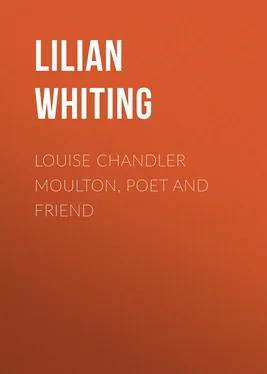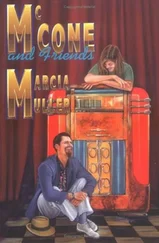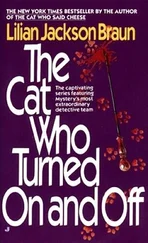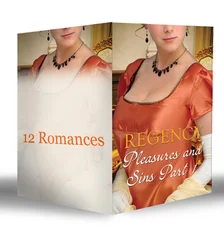Lilian Whiting - Louise Chandler Moulton, Poet and Friend
Здесь есть возможность читать онлайн «Lilian Whiting - Louise Chandler Moulton, Poet and Friend» — ознакомительный отрывок электронной книги совершенно бесплатно, а после прочтения отрывка купить полную версию. В некоторых случаях можно слушать аудио, скачать через торрент в формате fb2 и присутствует краткое содержание. Жанр: Биографии и Мемуары, foreign_antique, на английском языке. Описание произведения, (предисловие) а так же отзывы посетителей доступны на портале библиотеки ЛибКат.
- Название:Louise Chandler Moulton, Poet and Friend
- Автор:
- Жанр:
- Год:неизвестен
- ISBN:нет данных
- Рейтинг книги:4 / 5. Голосов: 1
-
Избранное:Добавить в избранное
- Отзывы:
-
Ваша оценка:
- 80
- 1
- 2
- 3
- 4
- 5
Louise Chandler Moulton, Poet and Friend: краткое содержание, описание и аннотация
Предлагаем к чтению аннотацию, описание, краткое содержание или предисловие (зависит от того, что написал сам автор книги «Louise Chandler Moulton, Poet and Friend»). Если вы не нашли необходимую информацию о книге — напишите в комментариях, мы постараемся отыскать её.
Louise Chandler Moulton, Poet and Friend — читать онлайн ознакомительный отрывок
Ниже представлен текст книги, разбитый по страницам. Система сохранения места последней прочитанной страницы, позволяет с удобством читать онлайн бесплатно книгу «Louise Chandler Moulton, Poet and Friend», без необходимости каждый раз заново искать на чём Вы остановились. Поставьте закладку, и сможете в любой момент перейти на страницу, на которой закончили чтение.
Интервал:
Закладка:
Edmund Clarence Stedman, who had just left Yale College and who, at the beginning of his literary career, was editing a country paper in Connecticut, greeted Miss Chandler's book with the ardent praise of youth and friendship; but these warm phrases of approval were also the almost unanimous expression of all the reviewers of the day. The twentieth century reader may smile at Mr. Stedman's youthful distrust of the "strong-minded woman," but his remarks are interesting. Of "This, That, and the Other," he wrote:
"'This, That, and the Other,' is a collection of prose sketches and verse from the pen of a young lady fast rising into a literary reputation; a reputation which, though it is achieved in no 'Uncle Tom' or 'Fanny Fern' mode, is no less sure than that of Mrs. Stowe, or Sara Payson Willis, and will be more substantial, in that the works on which it is founded are more classic and in better taste.... Miss Chandler is a native of Pomfret in this state, and every denizen of Connecticut should be proud of her talents. She is beautiful and interesting; her manners are in marked distinction from the forwardness of the strong-minded woman of the day...."
Epes Sargent, in the Boston Transcript , said:
"… The ladies have invaded the field of fiction and carried off its most substantial triumphs. Mrs. Stowe, Fanny Fern, and now another name, if the portents do not deceive us, is about to be added—that of Miss Chandler, who although the youngest of the band (she is not yet nineteen), is overflowing with genius and promise. Such tales as those of 'Silence Adams,' 'A Husking Party at Ryefield,' 'Agnes Lee,' and 'Only an Old Maid,' reveal the pathos, the beauty, the power, the depth and earnestness of emotion that Ellen Louise has the art of transfusing into the humblest and most commonplace details.... But Ellen Louise must not be deceived by injudicious admiration. Her style, purified, chastened and subdued, would lose none of its attractiveness. She gives evidence of too noble a habit of thought to desire the success which comes of the hasty plaudits of the hour."
The book reviewing of 1853 was apparently not unlike the spelling of George Eliot's poor Mr. Tulliver,—"a matter of private judgment." For although the stories of Ellen Louise were singularly sweet and winsome in their tone, with an unusual grasp of sentiment and glow of fancy for so youthful and inexperienced a writer, they could yet hardly claim to rank with the work of Mrs. Stowe. The leading papers of that day united, however, in an absolute chorus of praise for the young author, who is pronounced "charming," and "overflowing with talent"; the "refinement and delicacy" of her work, her "rare maturity of thought and style," and a myriad other literary virtues were discerned and celebrated to the extent that the resources of the language of the country would allow. A sonnet was written to her, signed "B.P.S.," which signature is easily translated to us in these days as that of B.P. Shillaber, the author of "Mrs. Partington." The sonnet is entitled:
Take this, and that, and t'other all together,
We like you better every day we're breathing;
And round our hearts this pleasant summer weather
Your fairy fingers deathless flowers are weaving:
We read delightedly your charming pages
Fraught in each line with truth and magic beauty;
Here starts a tear that some hid woe assuages,
And there is heard a voice that calls to duty.
And proudly may Connecticut, sweet Ellen,
Point to the genius bright that crowns her daughter,
And the rare graces that she doth excel in,
Confessed in floods of praise from every quarter.
The world forgives the wooden nutmeg suction
Because of you, the best Connecticut production.
The succeeding year Miss Chandler passed at Mrs. Willard's Seminary in Troy, N.Y., and a classmate, who in after years became the wife of General Gillespie, thus describes her:
"My acquaintance with Louise Chandler began when she entered Mrs. Willard's Seminary in Troy, where we were both pupils. She was at once very much admired and beloved. Her first book, called 'This, That, and the Other,' had been published just before she came, and we were all very proud of her authorship. She had a lovely face, very fair, with beautiful, wavy, sunny hair, falling on either side the deep blue-gray eyes, with their dark, long lashes. Her voice was clear and sweet, with the most cultivated intonation."
For the school Commencement Miss Chandler was chosen class poet, and produced the regulation poem, neither better nor worse than is usual on such occasions. Six weeks later, August 27, 1855, she married William Upham Moulton, editor and publisher of The True Flag , a Boston literary journal to which his bride had been a frequent contributor.
The journalists of the day made many friendly comments upon the marriage of their brother editor. Some of them ran thus:
"The possession of a noble and true heart in the one, and of a gentle and winning nature in the other, are presages of future bliss."
"Mr. Moulton is a writer of much originality of style and great power; an independent thinker, shrewd in conclusions and fearless in expression. Miss Chandler overflows with kindness, geniality, appreciation of the lovely, and the power of description to a remarkable degree."
"… Of his choice the world can speak. Her literary attainments have made their public mark, and her kindness of heart has won for her an eminent place in the affections of thousands. Our associate may well be congratulated on his acquisition of a new contributor to his happiness, and pardoned, in view of the richness of his prize, for leaving the fair of our own locality for more distant Connecticut."
One of the girlish pictures of Miss Chandler bears the inscription, in her own writing, "Taken the day I first saw my husband," but unfortunately, the date is not given. In a little sketch Harriet Prescott Spofford remarks that "Louise must have combined studying, writing, and love-making to a rather remarkable degree during her last year at school"; and adds in regard to her marriage:
"She was barely twenty when she married William Upham Moulton, a man of culture and of much personal attraction. Lingering a moment on the church porch in the sunset light, she has been described by one who saw her as a radiant being, in her bridal veil, blooming, blushing, full of life and joy and love. An exquisite skin, the 'rose crushed on ivory,' hazel eyes, with dark lashes and brows, and a confiding, fearless glance, small white teeth, a delightful smile, cheek and chin having the antique line, all united to make a loveliness which no portrait has successfully rendered, and which tender consideration and grace of manner accented to wonderful charm."
Among her girlish treasures preserved for more than fifty years was a small blank book, on the fly-leaf of which she had written: "Ellen Louise Chandler Moulton, from my husband, Aug. 27, 1855, Elmwood Cottage, Pomfret, Conn."; and underneath in quotation, the lines:
"Who shall decide? The bridal day, oh, make it
A day of sacrament and present prayer;
Though every circumstance conspire to take it
Out of the common prophecy of care!
Let not vain merriment and giddy laughter
Be the last sound in the departing ear,
For God alone can tell what cometh after—
What store of sorrow, or what cause to fear."
Mr. Moulton brought his bride to Boston, where she was at once introduced into those literary circles made up of the chief men and women of letters. "Here," said one who remembers her entrance into Boston life, "the bright, quick, impassioned girl speedily blossomed into the brilliant woman." In some reminiscences of her own in recalling this delightful period she said:
Читать дальшеИнтервал:
Закладка:
Похожие книги на «Louise Chandler Moulton, Poet and Friend»
Представляем Вашему вниманию похожие книги на «Louise Chandler Moulton, Poet and Friend» списком для выбора. Мы отобрали схожую по названию и смыслу литературу в надежде предоставить читателям больше вариантов отыскать новые, интересные, ещё непрочитанные произведения.
Обсуждение, отзывы о книге «Louise Chandler Moulton, Poet and Friend» и просто собственные мнения читателей. Оставьте ваши комментарии, напишите, что Вы думаете о произведении, его смысле или главных героях. Укажите что конкретно понравилось, а что нет, и почему Вы так считаете.












